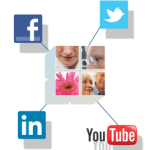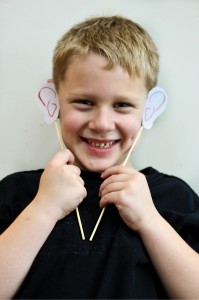By our Smarty friends at Charlotte Eye Ear Nose & Throat Associates
Dawn Hulthen-Koncsol, AuD
You probably already know that children learn to speak by listening to and imitating sounds they hear. Without good hearing, they cannot properly learn the sounds of language which are the building blocks of spoken words. A child could potentially learn sounds incorrectly because they cannot hear clearly.
The cause of hearing loss can vary. Some children are born with hearing loss while others develop hearing loss after birth. Hearing loss may be related to recurrent fluid in the middle ears, family inherited hearing loss or childhood illnesses. Overworking the ears can lead to hearing loss as well. Some common examples include listening to earphones too loudly, attending loud concerts, and participating in loud activities such as lawn mowing without protecting the ears. Children should wear earplugs during loud events and the volume of his or her iPod should be monitored.
Detecting hearing loss in children can be challenging in their early years, but there are several signs that your child may show if he or she is experiencing hearing loss. A child may fail to respond to a parent calling their name. Hearing loss can contribute to speech and language developmental issues. The television volume may need to be turned up louder than expected. A child might have school-related issues such as inattention or difficulty with schoolwork because they cannot hear the teacher and understand the lessons. It is crucial to detect any type of hearing loss as early as possible so treatments can be implemented immediately.
There are several tests available if you suspect that your child may have hearing loss. Otoacoustic emission (OAE) and Auditory Brainstem Response (ABR) testing are objective electrophysiological tests that can be run from the day of birth and on to asses each ear for hearing function. As a toddler, a child will begin to participate in behavioral testing in a sound booth. They might respond to sound in connection to a light- up toy or through conditioned play by placing a block in a bucket when they hear a sound. School aged children or older often participate as an adult would and respond to sounds and words through headphones by raising their hands. If a child has recurrent ear infections, they might be a candidate for pressure equalization tubes that regulate the air flow to the middle ear. If a child has true permanent hearing loss, they could be a candidate for hearing aids or even a cochlear implant. There are so many fantastic options available for treatment today.
If you suspect hearing loss in your child, call Charlotte Eye Ear Nose & Throat Associates (704-295-3000) to schedule a hearing test with one of our Audiologists.
Charlotte Eye Ear Nose & Throat Associates

6035 Fairview Road
Charlotte, NC 28210
704-295-3000
Click here for locations.
You can find CEENTA on facebook, twitter, blog & youtube.




1 comment
We’ve got a child with complete and unexplained hearing loss in one ear and have been treated by the Pineville and Southpark CEENTA teams. We are so grateful for their guidance during the last 7 years. Our son was 3 when diagnosed and the audiologists were great to work with him at his level to get accurate test results.